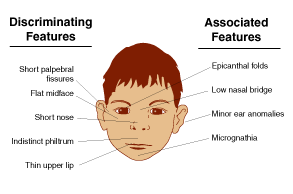 New Health Guide
New Health Guide
When a pregnant woman consumes alcohol, the fetus after being born can suffer from various conditions like fetal alcohol effects (FAE), alcohol-related birth defects (ARBD), and fetal alcohol syndrome (FAS). The most severe condition of these is fetal alcohol syndrome.
Alcohol use in pregnant women is documented to be around 9.4% and 2.6% are binge drinking cases as per the 2011 National Survey on Drug Use and Health. Studies have shown the rate of alcohol consumption to be of 52% in women of childbearing age (18-44 years) and 15% of binge drinking.
 The infants whose mother has had alcohol regularly during pregnancy will display fetal alcohol spectrum disorders. These disorders can be mild, moderate or severe and can be physical, behavioral, cognitive or all of them.
The infants whose mother has had alcohol regularly during pregnancy will display fetal alcohol spectrum disorders. These disorders can be mild, moderate or severe and can be physical, behavioral, cognitive or all of them.
The most severe condition is fetal alcohol syndrome and the problems associated with it are vision, hearing and memory problems. They have short attention span, difficulty in learning and communication. The symptoms vary from person to person, but are most often permanent. It leads to fetal alcohol syndrome in adults as well.
The symptoms of fetal alcohol syndrome can be categorized into the system it falls under. We shall look at the most commonly seen symptoms:
Physical symptoms:
Problems of the brain & CNS:
Social & behavioral disorders:
It is important to seek help from the doctor if you cannot stop drinking and are pregnant. Early diagnosis can help in reducing the long term problems in children.
When dealing with adopted or foster care children, it is not known whether the mother had alcohol during pregnancy. In case the child exhibits any symptom associated with FAS, it should be brought to the attention of the doctor.
When alcohol is consumed during pregnancy, the following occurs in the body:
When a pregnant woman drinks alcohol in any amount, the unborn child is at risk of developing fetal alcohol syndrome. The higher the quantity of alcohol is, the higher the risk is. For this problem, binge drinking causes more harm than having small amount of alcohol. There is no level of alcohol which can be considered as safe to be had during pregnancy.
Alcohol consumption during a particular phase of pregnancy can determine the level of harm done to the fetus. It is most harmful in the first trimester; however, alcohol during pregnancy is always harmful.
Fetal alcohol syndrome does not have any cure, and the physical and mental problems will last for a lifetime. In case the diagnosis happens early, intervention can be done to prevent the development of secondary disabilities. The following interventional measures can be taken:
The most effective method of preventing fetal alcohol syndrome is to abstain from alcohol during pregnancy. In case a woman has alcohol occasionally prior to realizing the presence of pregnancy, it does not do much harm to the fetus.
There is no safe level determined to be had during pregnancy and for this reason. If a woman is attempting to conceive or suspects of being pregnant, she should discontinue alcohol intake immediately. Alcohol intake by father has not been linked with fetal alcohol syndrome; however, men who abstain from alcohol can help their partners better.
Watch the video below to understand why it is extremely dangerous for a pregnant woman to drink alcohol beverage: